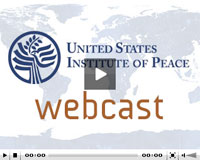
Can You Help Me Now? Mobile Phones and Peacebuilding in Afghanistan
Smart Tools for Smart Power II
Please note: This event will be webcast live beginning at 9:00am EDT on June 24, 2010 at www.usip.org/webcast.html
Location: U.S. Institute of Peace, 2nd floor, conference room 1200, 17th St, NW Washington, DC 20036
Mobile phone technologies are the subject of considerable enthusiasm in the peacebuilding sector. In the past few years, they have been used in connection with campaigns to restrain election violence, reduce corruption, develop the news media, and support counter-insurgency to name just a few. Success has been significant, but mixed. Yet little has been done to evaluate systematically the factors of success or failure in the use of mobile phones for peacebuilding.
So to best understand the true potential of these increasingly powerful tools, USIP — in partnership with cell phone pioneer Mobile Accord (who raised a record sum of over $37 million within three weeks of Haiti’s earthquake crisis with their “Text HAITI to 90999” campaign), the National Defense University, the United Nation’s-mandated UPeace, and TechChange — will bring together experts on international peacebuilding and mobile phone technology to focus on the use of mobile phones in one of the most difficult conflict environments today: Afghanistan.
- Improving governance – rule of law and anti-corruption
- Countering extremism – media development and counter-insurgency
- Delivery of essential services – education, health, agricultural development, commerce
Agenda
- Amb. Richard Holbrooke, Opening Remarks
Special Representative for Afghanistan and Pakistan - Sheldon Himelfarb, Moderator
Executive Director, Center of Innovation for Science, Technology, and Peacebuilding
United States Institute of Peace
Panel 1: Mobile Phones for Tackling Corruption and Improving Governance
Panel 2: Mobile Phones for Countering Extremism and Counter-insurgency
Panel 3: Mobile Phones and Essential Service Delivery
Panelists will include innovators from the DoD, Department of State, UN personnel, World Bank, Internews, and NGOs (US and European) like ICT4Peace, Ushahidi, FrontlineSMS, and Mobile Active.



